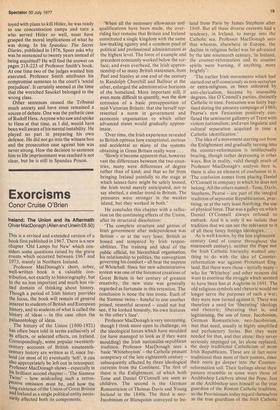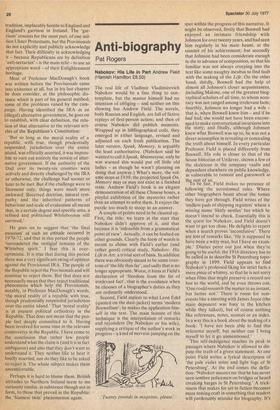Exorcisms
Conor Cruise O'Brien
Ireland: The Union and its Aftermath Oliver MacDonagh (Allen and Unwin £6.50) This is a revised and extended version of a book first published in 1967. There is a new chapter 'Old Lamps for New' which considers some questions raised by the grave events which occurred between 1967 and 1973, mainly in Northern Ireland.
' Professor MacDonagh's short, sober, well-written book is a valuable contribution, not exactly to historiography, but to the no less important and much less visited domain of thinking about history. Though a period of Irish history provides the focus, the book will remain of general interest to students of British and European history, and to students of what is called the history of ideas — in this case often the Palaeontology of ideas.
The history of the Union (1800-1921) has often been told in terms exclusively of its effects, or selected effects, on Ireland. Correspondingly, some popular twentiethcentury accounts of British nineteenthcentury history are written as if, since Ireland (or most of it) eventually left', it can also appropriately be left out in retrospect. Professor MacDonagh shows —especially in his brilliant second chapter — `The Siamese Twins' — how misleading such a retrosPective omission must be, and how the long existence of the Union of Great Britain and Ireland as a single political entity necessarily affected both its components: 'When all the necessary allowances and qualifications have been made, the over riding fact remains that Britain and Ireland constituted a single kingdom with the same law-making agency and a common pool of political and professional administrators at the highest level. The force of example and precedent constantly worked below the surface; and even overhead, the Irish apprenticeship of so many British statesmen, from Peel and Stanley at one end of the century to Randolph Churchill and Balfour at the other, enlarged the administrative horizons of the homeland. More important still, if even more difficult to quantify, was the slow corrosion of a basic presupposition of mid-Victorian Britain: that she herself represented a norm in government and economic organisation to which other advanced states would gradually approximate.
'Over time, the Irish experience revealed to British opinion how exceptional, curious and accidental so Many of the systems obtaining in Great Britain really were . . .
'Slowly it became apparent that, however vast the differences between the two countries, many were differences of degree rather than of kind; and that so far from bringing Ireland painfully to the stage at which laissez-faire might be safely loosed, the Irish trend merely anticipated, not to say abetted, a similar trend in Britain. The pressures were stronger in the weaker island, but they worked in both.'
He concludes this chapter with a reflection on the continuing effects of the Union, after its structural dissolution: 'The complete structure and genius of Irish government after independence was British — or at the very least. British as honed and tempered by Irish responsibilities. The training and ideal of the public official, his hierarchical organisation, his relationship to politics, the conventions governing his conduct — all bear the impress of Whitehall. Since her new administrative system was one of the foremost creations of Great Britain in her century of greatest creativity, the new state was generally regarded as fortunate in this retention. The conclusion is none the less ironic. Each of the Siamese twins — hateful to one another joined, resentful severed — could not but see, if he looked honestly, his own features in the other's face'.
Professor MacDonagh is very interesting, though I think more open to challenge, on the ideological forces which have moulded (or have managed to look as if they were moulding) the Irish nationalist-republican tradition. Professor MacDonagh sees a basic 'Whiteboyism' — the Catholic peasant conspiracy of the late eighteenth century — subsequently affected by three ideological currents from the Continent. The first of these is the Enlightment, of which both Tone and Daniel O'Connell are seen as children. The second is the German Romanticism of Thomas Davis and Young Ireland in the 1840s. The third is neoJacobinism or Blanquism conveyed to Ire
land from Paris by James Stephens after 1848. But all these diverse currents had a tendency, in Ireland, to merge into the Catholic sea, Professor MacDonagh sees that whereas, elsewhere in Europe, the
decline in religious belief was far advanced by the late nineteenth century, 'in Ireland, the counter-reformation and its counter spirits were burning, if anything, more brightly': '
'The earlier Irish movements which had started out self-consciously as non-sectarian or extra-religious, or been coloured by anti-clericalism, became by insensible degrees, like O'Connell's parties, distinctly Catholic in tone. Fenianism was fairly baptised during the amnesty campaign of 1869; Pearse's new Fenianism positively conflated the seminarist gallantry of Trent with violent nationalism; and even linguistic and cultural separatism acquired in time a Catholic identification.'
The idea of a movement starting out from the Enlightment and gradually turning into the counter-reformation is intellectually bracing, though rather depressing in other Ways. But in reality, valid though much of Professor MacDonagh's analysis here is, there is also an element of confusion in it. The confusion comes from placing Daniel O'Connell in company in which he does not belong. All the others named — Tone, Davis, Stephens, Pearse — are part of the integral tradition of separatist Republicanism, practising, or at the very least tlorifying, the use of physical force. That was a galley on which Daniel O'Connell always refused to embark. And it is only if we isolate that tradition that we can see the relevance to it of all these fancy foreign ideologies.
As is well known, by the late eighteenth century (and of course throughout the nineteenth century), neither the Pope nor the Irish Catholic hierarchy wanted anything to do with the idea 'of Counterreformation war against Protestant England. But there were those — initially many — who for 'Whiteboy' and other reasons did want to continue the struggle which seemed to have been lost at Aughrim in 1691. The old religious symbols and rhetoric would no longer serve the purposes of such a War; they were now turned against it. There was therefore a need for `liberating' ideology and rhetoric; liberating that is, and legitimising, the use of force. Jacobinism, German Romanticism, neo-Jacobinism, met that need, usually in highly simplified and perfunctory forms. But they were needed for that, and that alone: they never seriously impinged on, let alone replaced, the deep traditional Catholicism of most Irish Republicans. These are in fact more traditional than most of their pastors, since their roots go deeper into the Counterreformation soil. Their feelings about their pastors resemble in some ways those of Archbishop Lefebvre about the Pope. Just as the Archbishop sees himself as the true guardian of the Roman Catholic tradition, so the Provisionals today regard themselves as the true guardians of the Irish Catholic tradition, implacably hostile to England and England's garrison in Ireland. The 'garrison' consists for the most part, of one million Ulster Protestants, but the Provisionals do not explicitly and publicly acknowledge that fact. Their difficulty in acknowledging it L, because Republicans, are by definition 'anti-sectarian' is the main relic to use an appropriate word of their Enlightenment heritage.
Most of Professor MacDonagh's book was written before the Provisionals came into existence at all, but in his last chapter he does consider, at the philosophic distance which is part of his general method, some of the problems raised by the campaign. Having identified the IRA as an (illegal) alternative government, he goes on to establish, with clear definition, the relation of that alternative to the relevant articles of the Republican's Constitution: 'But so long as the moral reality of a republic, with true, though prudentially suspended, jurisdiction over the entire island, was officially asserted, it was impossible to root out entirely the notion of alternative government. If the authority of the Dail over its twenty-six counties were actively and directly challenged by the IRA or otherwise, the challenge had sooner or later to be met. But if the challenge were to Stormont only, things were much more awkward. Received doctrine, natural sympathy and the inherited patterns of behaviour and scale of evaluation all meant that, in a certain degree and specific area, a refined and politicised Whiteboyism still survived.'
He goes on to suggest that 'the final exorcism' of such an attitude occurred in 1970-72, and that in this period the people 'surrendered the vestigial remains of the Whiteboy spirit.' I fear this is overoptimistic. It is true that during this period there was a very significant swing of opinion against the Provisional IRA. The people of the Republic reject the Provisionals and will continue to reject them. But that does not necessarily mean that they reject traditional phenomena which help the Provisionals, notably, in Professor MacDonagh's words, 'the moral reality of a republic with true, though prudentially suspended jurisdiction over the entire island.' That 'moral reality' is at present political orthodoxy in the Republic. That does not mean that the people feel deeply committed to it. Having been involved for some time in the relevant controversy in the Republic, I have come to the conclusion that rather few people understand what the claim is (and it is in fact ambiguous) and also that they don't want to understand it. They neither like to hear it loudly asserted, nor do they like to be asked to reject it. The whole subject makes them uncomfortable.
Perhaps it is hard to blame them. British attitudes to Northern Ireland seem to me curiously similar, in substance though not in form, to those that prevail in the Republic: the 'Siamese twin' phenomenon again.



































 Previous page
Previous page